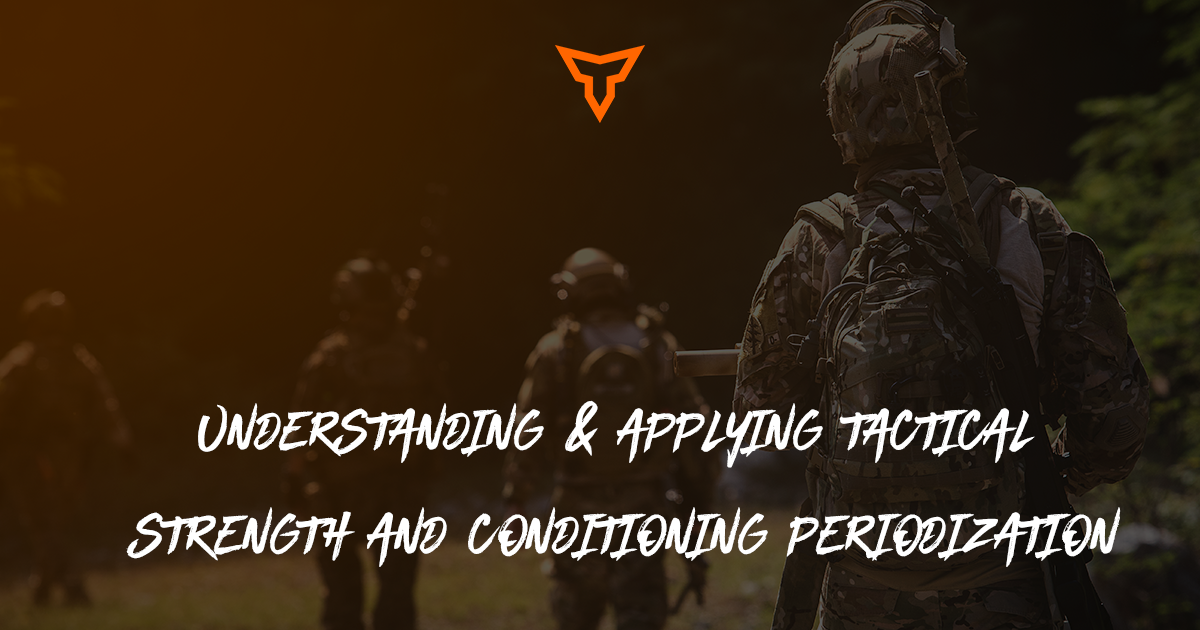My Journey to Tactical: Comparisons to the College Sector
Why I Made the Switch
Before I jump into the differences and similarities of each entity, I want to talk about why I made the switch, so if you do not care to hear my story just skip to the end of the article for the cliff notes. Back in early 2020 (pre-COVID), from an outside perspective, some would say I had “made it” in the college realm. I had reached my goal much earlier than I thought; working for a large university with successful teams or teams that were on the rise. The athletic department was building weight rooms that one could only dream of. Each redesign had every piece of equipment and fancy gadget that a young strength coach could wish for. Additionally, I was in charge of running an internship program and helping shape the young minds of strength and conditioning, which was something I always wanted to do. When I began my journey in strength and conditioning, the description above is what I thought would be a perfect dream. The reality of the situation was, that I was constantly working 10-12 hours a day, on top of a few weekends, for a salary where one paycheck went entirely to rent. Basically, I had very little spending money or time to enjoy a balanced lifestyle. To sum it up, I was just getting by and feeling really burnt out.
The long hours, little pay, and lack of a balanced lifestyle created the gas leak for me. The igniter for my change in path was that I realized there is no clear path working up the ladder in college. Unfortunately, in the college world, sport coaches make many calls; a reality that is understandable since they are the ones with W-L behind their names. Working from the lens of a sport coach, what stands out when you read a Strength Coach’s resume? How many years they’ve worked with a specific sport. Therefore, in the strength and conditioning field, you almost need to specialize in the sport that you wanted to work with. What two sports are at the top? Football and basketball.
At the time, our staff was organized, or tiered, by the most funded sport down to the least funded, i.e. football strength coaches took precedent, followed by men’s and women’s basketball. This is completely understandable, but for a young strength coach to move up in the current system, one would have to switch towards men's or women’s basketball or switch schools entirely. If I wanted to stay at the current school I was working at, I would first need one of the strength coaches who had more experience to leave, hope I got hired with the little experience working with basketball, and for me, I had no desire to work with those sports. Therefore, the reality of the situation was that I was stuck in a position of getting by with this so-called salary and the buildup of burnout.
So, what did I do…I went to Indeed and began looking. I made a few discoveries. The first was that I could move somewhere else in the country, make the same salary, and ACTUALLY be making money because the cost of living was so much cheaper. Only half a paycheck went to rent, instead of the whole thing, so I could pocket the other half or actually have spending money for the weekends. The second discovery was I did not have a plan. I had no idea what teams I wanted to work with and the teams that I had been working with were not the teams I wanted to become a specialized strength coach in. I was not even sure if I wanted to stay in the college realm and I even had the thoughts of “Do I need to switch careers entirely?” I applied to some different college job offers and got a few interviews in a variety of sports. I obviously did not want to end up in the same situation that I was currently in three years later. After every interview, I would reflect and decide if that was the right situation (place to live, team to work with, good organization, opportunity to move up). After every college interview, my gut was saying not the right fit.
The Interview
I happened to stumble upon a military contractor position down in San Antonio, Texas, and thought that is something different and could be cool so why not. Worst case scenario: it sucks but it gives me a break from the college realm for a few years then I can go back, so I applied. Luckily, the phone interview went smoothly, and I had the chance to fly down and see what this side of strength and conditioning was all about. I was pretty fired up about this opportunity so I made sure to pack my suit so I looked my best. The plan was to fly in late on Wednesday, interview Thursday, and fly back. Obviously being a strength coach, I could not miss a training day so I packed some workout clothes as well to get a little hotel workout in before the interview Thursday.
Once I landed in San Antonio I reached out to my POC for this interview and asked what time do we plan to start tomorrow? I figured it’s military so they probably start early. I am waiting and waiting for this response until around 2030 (8:30pm) and I see a text that says “I will pick you up at 0500 you have a 3-mile ruck tomorrow with the candidates.” I remember reading that and was completely caught off guard. I thought thank goodness I brought workout clothes. Then I thought “What is rucking?” So I Googled and read that it is ‘walking with a heavy-duty pack’... okay not terrible. I told myself as long as it is not running three miles I should be good or are they running? I’m a strength coach so anything over five reps was considered cardio. I hadn’t done anything cardio over three miles except for your occasional walk around campus and that still wasn’t anything close to what I was about to do during my interview. To say I was nervous was a little bit of an understatement. So that morning I got picked up and was driven on base (of course the gate traffic was terrible).
We parked basically out in the middle of nowhere on base on this small dirt road. One by one, cars pulled up and it was a variety of different coaches - some swim, some run, and some S&C. I’m meeting and talking with everyone until a bus pulls up, and around 170+ candidates hopped off the bus to train. I then asked one of the coaches “Are you training all those candidates at once?” They respond “Yep, every day.” My collegiate weight room was on the small side so we trained no more than 30-40 athletes per group. As the candidates lined up with their rucks on in 2-by-2 lines ready to begin, I get handed a ruck and put it on. That pack was breath-takingly heavy and I thought “F***”. I asked, “What is this filled with?” the coach responds, “Just a couple of MB’s, it will be easy I will walk with you.” I later found out it was 80lbs. The candidates took off on what seemed to be an incredibly fast walk and I was doing my best to keep up. Immediately my anterior tibialis was on fire and luckily eventually went numb after the first mile. We had to go down the dirt road to a pole and turn around. It seemed like forever to get to the pole. I turned and asked “How far is the turnaround?” and the coach responded “Half a mile so down and back is a mile.” Every half mile I seem to drift further and further from the candidates until they were almost out of sight. Luckily, at that point the ruck was finished, and thought “Thank goodness I made it.” By this point, I was completely drenched in sweat and ready for lunch. I noticed the candidates were getting back on the bus. I asked what is next and someone said, “They have the pool next.”
Thank goodness I only observed these candidates' pool training (I’m a below-average swimmer). The first thing these candidates did was perform a 25m underwater swim and swim back on a running interval timer. Which meant the faster you completed the exercise, the more rest you’d get, and the slower you were, the less amount of rest. I am a poor swimmer, so I was amazed at how calm some of these candidates were, especially later finding out most of them were 18-20ish years old. It was impressive to see from an outside perspective. After underwaters, they performed some mask and snorkel recoveries where the swim coach would throw the candidates' mask and snorkel out a certain distance and the candidates would have to swim out, put the mask on at the bottom of the pool, and swim up using the snorkel, spin a few times treading and then swim to the coach directing. After the pool, I did the interview, so I never had to wear my fancy suit. My hip flexors had never been as sore as they were the following day from that ruck. All in all, the experience was amazing and from that point on, I knew that was the group of athletes/team I wanted to work with. Luckily, I was fortunate enough to get the job and I have been here ever since.
Life in Tactical
Differences
Now being in this position for two years, I am sure you want to know the difference between working in the college realm compared to a military setting.
- Population
First off, the candidates that you work with are not high-end athletes that you would be used to working with in college. Obviously, there are a few that definitely could have gone and played D1 ball, but a good portion are not that. Do not assume the best athletes are the biggest badasses. Successful military members come in all sizes and not everyone is going to be a 6’5” superhuman/terminator. Some if not most look like average Joes. Many candidates are normal individuals who have done or are in the process of doing extraordinary things. - Programming
A lot of your programming is not going to be flashy, fancy, and specialized. A good portion is focused on the basics/fundamentals of movement (squatting, hinging, lunging, hopping, skipping, and running). If you train a younger population, it will be similar to training a bunch of freshmen repeatedly. If you’re working with more seasoned individuals, the goal is keeping guys healthy and working around previous injuries. - Number of Athletes
There is a high chance you may be training a larger number than what you were used to in college. Instead of a group of 30 being the highest you might be training 30-100 candidates at a time with multiple strength and conditioning coaches. - Competitive Mindset
Pretty much all the military members that I have worked with have a passion for working out and pushing themselves to new limits. They will take in high amounts of (training) volume and not complain about it; much like wrestlers. I cannot say that was the truth when working with all my college athletes. For some, working out/training was more of a side gig that came with playing the sport. With that being said, I recommend you monitor your volume closely. - Training Goals
When it comes to the overall training goal for military members, that goal is much different from athletes. Athletes are specialized and mostly work toward a high-power output threshold/performance versus the military which could be more health driven or capacity-driven. This requires multiple methods of training (speed, agility, conditioning, mobility, distance running, and even swimming). Compared to college which may only require a few of the methods listed above that meet the demands of the sport. - Training Blocks
Depending on where you work or what military personnel you’re working with, you might only see the individuals for a couple of weeks before shipping them off to deployment or another course. So building relationships with the students/athletes is much more time constrained compared to college and working with the same athletes for four years. - Time Allocations
Finally, from the work hours standpoint, your workdays are different. Military courses are based around an eight-hour work day plus a 30-60 minute lunch. That means candidates and personnel are restricted from working over 40 per week and weekends are a no in most cases. Generally, salaries are a little bit higher than the average college job. However, you will not be making the salary of a higher-end football or basketball strength coach.
Similarities
When comparing the entities, the bare bones of the job and/or focus are the same. You are given a block of time to work out/train candidates. In that period, you have to design an efficient and effective program. Equipment, number of candidates, and weather conditions could all affect what you have planned or would like to do.
- Monitor and Adapt
Just like in college, as a tactical strength coach, it is important to be creative and innovative with your approaches. You have to manage the amount of volume that is given. Similar to athletes, active duty members suffer many injuries and many have to do with overuse or too much volume. It is important to track and be aware of.
- Educating the "Coaches"
Instead of a sport coach overseeing the training, you have active duty members. Similar to sport coaches where some think how they trained is the only way. Some active-duty leaders get it and some need more education on the subject. This is all new to the military so you may face the “Back in my day, we just did cals and ran miles,” leaders or you might get the new innovative type that lets us try something new so candidates are not broken like myself. - Relationships Rule
Just like working with a sport coach and building their trust, the relationship you build with active duty makes the difference. Building that trust like you would with the head coach allows you to open up that arsenal when it comes to training methods. When too much volume training occurs, and over-use injuries happen, the discussions on correcting this become easier and changes are more welcoming because of that relationship you built. Be open to active duty feedback as if you were learning the dynamics of a new sport you are working with in college.
- Build Systems
In college, once you completed a year or two, you begin to see trends and develop a training system. The same can be said for the tactical world depending on how long you work with specific personnel. The training process becomes a rinse, refine, and repeat. It is just a short and condensed version of college. - Keep It Simple
Training is similar to training freshmen in college. The meat and potatoes of the programs are how to squat, hinge, and move correctly. You spend a lot of time perfecting the basics and making sure candidates understand it to carry over to specific tasks. Some candidates will perfect that technique quickly, others will need repetition every day. - Compete
Finally, similar to athletes, the personnel you train love to compete. Use that to your advantage and make training fun.
Overall, the switch from college to tactical/military has been a true success. By no means am I rich. I make enough money to have the balanced lifestyle that I had always wanted. I am not allowed to work myself into the ground since I am restricted to a 40-hour work week. When it comes to your strength and conditioning career, I think you need to figure out what you want to get out of it. When I first started out, I thought the big/flashy school job was everything. And now looking back on it, it was a great experience, and I’m glad I did it, but I just wanted to train hard-working individuals and still have that balanced lifestyle.
For some of you, you may want the glamour to be on TV training professional athletes. If that is the case then I would not recommend the tactical training environment. If you love game day and the hype, this is not the group to train. If you enjoy training and the process of training and want to help average people do extraordinary things, while having a little more free time for a balanced lifestyle, then I suggest you look into it. Whatever your path is…make sure it brings joy and meaning to you. By no means did I want this article to be a bash to the college realm. I just wanted to possibly open the door for other strength coaches who find themselves in my shoes. I actually want to thank all the great coaches that I have had the privileged to work with, wonderful athletes who had the drive to want to be better and trusted in me, and especially the fantastic mentors that I have worked under in my career. I have learned so much from each of you and I appreciate the time you invested in me. I definitely would not be where I am without all the great teachings I learned in the college realm of strength and conditioning.
Subscribe to our blog
Subscribe to receive the latest blog posts to your inbox every week.
Related posts

Things I Wish I Knew Before Going TSAC: Part 3

Understanding & Applying Tactical Strength and Conditioning Periodization


